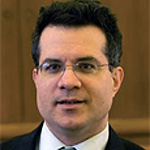Today’s decision by the U.S. Supreme Court that the Constitution guarantees a right to same-sex marriage is justified, say two constitutional law experts at Washington University in St. Louis.

“Ever since Lawrence v. Texas was decided in 2003, the treatment of same-sex couples under state marriage law has been inconsistent with the logical extension of the meaning of the 14th Amendment established in that case,” said Neil Richards, JD, professor of law.
“Obergefell v. Hodges corrects this inconsistency, and is a massive victory for the ideas that all people have the right to choose whom they marry, and that all people are equal under the law regardless of sexual orientation,” he said.
Richards said it is interesting to note “not just how quickly the issue of marriage equality has developed in the United States, but that today’s decision is not the mandate of an activist Supreme Court.”
“The marriage equality debate has taken place largely in the political process, and state — and international — experimentation with same-sex marriage has shown the legal inadequacy of arguments against marriage equality,” Richards said.
“Today’s Supreme Court decision is legally justified, and marks the end of a long and unjustifiable form of legally-sanctioned discrimination in America — discrimination in the right to marry the person of one’s choosing.”
Greg Magarian, JD, professor of law, agrees.

“The dissenters insist that marriage essentially consists of a bond between a man and a woman and that constitutionalizing anything else defies tradition,” he said. “They miss two essential truths: first, that constitutional rights depend on more than tradition; second, that society has changed in ways that make today’s decision not just credible but unavoidable.”
Beyond its obvious social impact, today’s decision matters in its “conviction about how the court deals with constitutional rights,” Magarian said.
“Judges have to make judgment calls, and justices empowered to explicate the Constitution have to make judgment calls about constitutional rights,” Magarian said. “The job of constitutional law is to modulate the relationship between the people and the government in ways that give effect to prevailing, sturdy societal understandings. There is no path of least resistance. Sometimes the court overreaches, as with Dred Scott and Lochner. History then judges the court harshly, and society ultimately spurs the court to correct its mistake. Today’s decision is, among other things, a bet on history’s judgment. It looks to me like a very sound bet.”
Richards is available for media interviews at nrichards@wustl.edu. Magarian is available at gpmagarian@wustl.edu.